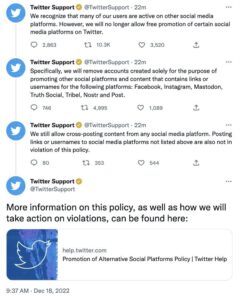There’s been some bit of drama over on the Twitters lately that causing folks to look for other alternative social platforms that might better suit them and their internet web presence.
It didn’t take long for the trouble on Twitter to get other alternative social media platforms to come crawling out of the woodwork. Some of these platforms have been around a while (since 2015), while others are currently being put together on-the-fly even as I write this.
It’s hard to have a true internet web presence if everything you do is on social sites. If the bulk of your work resides on a social platform, or somewhere off in the cloud, what happens when these social platforms, or cloud operations update their platform terms, or, as in some cases, close entirely, taking all of your hard earned work and effort with them.

Even as I write this the rules over on Twitter are changing so quickly that it’s hard to keep up. I guess after today, you aren’t allowed to post a link to your other social platforms because if you do, you’ll get banned from the Twitter platform. It’s somewhat Orwellian but that’s just the way it is .. at least on Twitter at this point. Who’s to say that other platforms won’t start doing this sort of thing in the future? It’s always best to own your own first before jumping off into the realms of social.
Some platforms will let you download your work, but then what? Here you have your work with really no place to go with it. Also, never mind that your work still resides out there somewhere on a server in some obscure archive.
Never trust the terms or the security of an internet web property that you don’t own outright. Crackers and Script Kiddies are constantly at the door of social platforms, jumping at the slightest opportunity to take the social platform, and you — down — in an instant. Owners of the social platform may for some reason, just decide to shut it all down, or sell to someone else who would shut it all down.
Everything that you load to a social platform, whether it be Twitter, Facebook, or Pinterest, to name just a few .. ceases to be your intellectual property. All of your thoughts, ideas, and good effort becomes owned, and legally, by which ever social platform you choose to load to. None of your “stuff” belongs to you, truly exclusively, the second you load it to a social platform.
I received an email the other day from a guy in Scranton PA wondering why I don’t post more of our direct business related materials to our Facebook Fan Page. What I do here doesn’t belong to Facebook — it never will belong to Facebook, because I’m not going to load it to Facebook.
If you are curious about what goes on here directly then you’ll have to actually visit this site I’m afraid. We don’t post intellectual property to social platforms, and neither should any of you. If I happen to have a good idea, or something that might be particularly useful, it gets posted in this blog, and only this blog. I post a link to the idea or useful item to the social platform that points to this blog. If the social platform goes away, all I lose is a link and that’s it — our property remains ours.
From your personal weblog, to your art galleries — Nothing is going to be as protected, copyright wise, as hosting them on your own internet web domain. If you post a picture on your domain, and for some reason it ends up being posted to Facebook — then you can legally have it removed from the platform — because after all, it’s yours. It doesn’t belong to anyone else but you. If you post that piece of art to a social platform, it immediately becomes the property of that platform, and you don’t have a leg to stand on with regard to getting it removed — they own it — because you gave it to them.
Don’t think so? — Read on ..
Here’s what Facebook says:
“For content that is covered by intellectual property rights, like photos and videos (IP content), you specifically give us the following permission, subject to your privacy and application settings: you grant us a non-exclusive, transferable, sub-licensable, royalty-free, worldwide license to use any IP content that you post on or in connection with Facebook (IP License). This IP License ends when you delete your IP content or your account unless your content has been shared with others, and they have not deleted it.” – Facebook
Here’s the hook — Facebook deletes nothing when you close your account with them. Facebook is included with “the others” in it’s statement. Your stuff will remain in storage on Facebook forever.
In a nutshell, anything you do on Facebook, doesn’t belong to you, it belongs to Facebook. Your social web presence isn’t really yours after all.
Content is king, and has been since the beginning of the internet. Content drives ad sales, as both Google and Facebook have proven time and again.
These new social platforms understand every bit of this and are screaming for their new users to provide as much content as possible.
Without content they can’t exist.
Here’s what Post.News has to say about content:

“We would love to have your content on Post. You can share your writings as a link but if you use the Composer and share it on-platform, the reading is much easier and faster. Just copy and paste your blog or newsletter content into the Composer, format, and post.”
“You can also share your premium content and add a paywall yourself. The Post economy is built on Points but the conversion rate is 1pt = $0.01. You get 100% of whatever price you add to your content. This way, people can read your premium content without having to commit to a subscription.” – Noam Bardin — Chief Poster
Sure, you can put your content on Post for pennies on the dollar, but what kind of ad revenue will Post be making for themselves as a result of you posting your content to the platform? Don’t think for a minute that platform admins won’t circumvent your paywall and use you to garner ad dollars for the platform as a whole, because they will.
If you are serious about establishing a solid and authoritative internet web presence, don’t start out on social media — do it on your own. Use your own registered domain. Only upon after establishing your internet web presence on your own domain, should you be wandering out into the social web to market your wares, your talents, your abilities.
Use the social platforms for teasers and loss leaders — Use the platforms to drive traffic to you.
From where I sit, places like Facebook, Twitter, and even Post are no different from each other … all cut from the same cloth.
Your social initiatives are extremely important — but building your business on a platform (domain) that you own is even more important than that.
You should never use a social platform as the primary hub for your business. By making your business website the center of all your online marketing activities, you can use as many external marketing entities that you want, as long as it all leads back to your own website.






